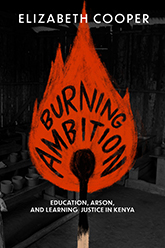|
Burning Ambition
Education, Arson, and Learning Justice in Kenya
Elizabeth Cooper
Amaury Talbot Prize for African Anthropology Winner
“Cooper provides a riveting tale of adolescent arsonists in Kenyan secondary schools and the ensuing demands for justice. Her judicious investigation into these cases presents a vital account of precarity and disillusionment in contemporary Kenya.”
—Kenda Mutongi, author of Matatu: A History of Popular Transportation in Nairobi
Why do students set their schools on fire?
Burning Ambition explores how young people learn to understand and influence the workings of power and justice in their society. Since 2008, hundreds of secondary schools across Kenya have been targeted with fire by their students. Through an in-depth study of Kenyan secondary students’ use of arson, Elizabeth Cooper asks why. With insightful ethnographic analysis, she shows that these young students deploy arson as moral punishment for perceived injustices and arson proves an effective tactic in their politics from below.
Drawing from years of research and a rich array of sources, Cooper accounts for how school fires stoke a national conversation about the limited means for ordinary Kenyans, and especially youth, to peacefully influence the governance of their own lives. Further, Cooper argues that Kenyan students’ actions challenge the existing complacency with the globalized agenda of “education for all,” demonstrating that submissive despondency is not the only possible response to the failed promises of education to transform material and social inequalities.
Elizabeth Cooper is an assistant professor in the School for International Studies at Simon Fraser University and a social anthropologist who conducts research concerning children and youth, inequality, and violence, with a primary focus on Kenya.
Praise
“A fascinating account of the multiple and sometimes perplexing reasons Kenyan students give for burning and seeking to destroy an institution ostensibly designed to help them: the school. A brilliant and gifted writer, Cooper delivers a significant contribution to anthropological studies of politics and development. This book is a must-read for anyone interested in the social and political tensions surrounding school violence in Kenya and anywhere.”
—Amy Stambach, author of Faith in Schools: Religion, Education, and American Evangelicals
“Convincingly helps us understand the active role that Kenyan youths take in forms of resistance. The voices of the students and the anecdotes illustrate the ways that their experiences are typical within this system and the inclusion of Kenyan intellectual perspectives helps us see how these issues are understood and debated within Kenya. This fine book presents rich ethnographic material that is expertly situated at an important theoretical juncture.”
—Megan A. Styles, author of Roses from Kenya: Labor, Environment, and the Global Trade in Cut Flowers
Of Related Interest
|

Spirit Children
Illness, Poverty, and Infanticide in Northern Ghana
Aaron R. Denham |

Mau Mau’s Children
The Making of Kenya’s Postcolonial Elite
David P. Sandgren |
|

Larger images
June 2022
LC: 2021041588 LB
232 pp. 6 x 9
10 b/w illus., 1 table
|

